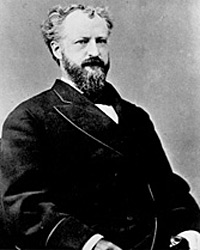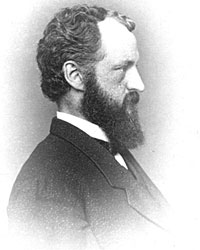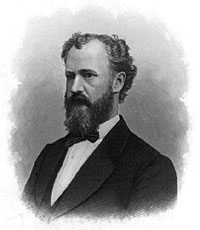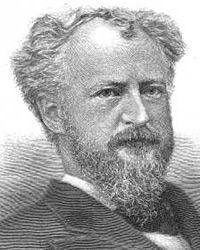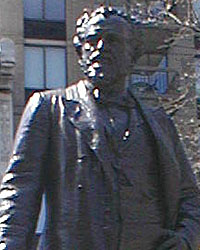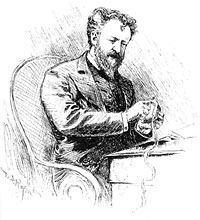
Roscoe Conkling, in his seat at the Senate
“I do like Roscoe Conkling of N.Y. — a smart man — well cultivated, young, handsome, polite, and withal a good listener,” wrote Attorney General Edward Bates of the congressman from Utica in upstate New York.1 Conkling was “a statesman of eminent, original, intrepid genius, whose place in our political system was akin to one of those tremendous phenomena we read of in the tropics, or when nature is in volcanic lands,” wrote journalist and friend John Russell Young.2 “Handsome and well endowed, he was superb in masculine beauty, with well modeled head, full beard, and pendant curl atop his forehead,” wrote historian James G. Randall “With his striking appearance, unbounded confidence, oratory, and talent for politician-like management, he was to ride the crest of triumphant politician-like management, he was to ride the crest of triumphant Republicanism almost to the presidency, while he was also to contribute to the intraparty factionalism so evident in the eighties.”3 Historian Allan Nevins described Conkling as “Lincoln’s brilliant young supporter in the House.”4
Brilliant in debate, Conkling, however, proved arrogant, abrasive and condescending to an increasing number of contemporaries as Conkling’s power and influence grew. The Upstate Republican was not likable. He was an “egotistical coxcomb,” according to Navy Secretary Gideon Welles.5 Biographer Donald Barr Chidsey said he was “haughty, supercilious, aloof.”6 Matthew Breen described Conkling was “Vain as a peacock, and a czar in arrogance.”7 Biographer Donald Barr Chidsey wrote: “Very arrogant he was, but very earnest.”8 Chidsey wrote that “Possibly like Pooh Bah he was born sneering.9 ” Another biographer, David Jordan, wrote: “‘Lord Roscoe, many called him, and he carried himself like a member of the higher peerage. Roscoe Conkling steps from the pages of history angry, haughty, larger than life. Although he was vindictive and overbearing, he was handsome, intelligent, and capable of orating for hours at a time without losing either a word of his memorized speech or a listener…”10
“Roscoe Conkling was created by nature for a great career. That he missed it was entirely his own fault,” wrote political colleague Chauncey M. Depew. “Physically he was the handsomest man of his time. His mental equipment nearly approached genius. He was industrious to a degree. His oratorical gifts were of the highest order, and he was a debater of rare power and resources. But his intolerable egotism deprived him of vision necessary for supreme leadership. With all his oratorical power and his talent in debate, he made little impression upon the country and none upon posterity. His position in the Senate was a masterful one, and on the platform most attractive, but none of his speeches appear in the schoolbooks or in the collections of great orations. The reason was that his wonderful gifts were wholly devoted to partisan discussions and local issues.”11
Chase family chroniclers Thomas Graham Belden and Marva Robins Belden wrote: “It was said that the Senator had one vice, but it was not thought to be entirely unattractive. There were always stories abroad linking his name with this woman or that, and it was said that a child in New York bore a shocking resemblance to him. His admirers, thinking him too handsome to be pure, suffered little nervous thrills at the thought of his wickedness. The Senator strutted around the capital with an air of complacency and said nothing. The whispered rumors enhanced his reputation; the reputations of the women involved were their own affairs.”12
Conkling had entered law and politics at an early age and was elected mayor of Utica before he was 30. Shortly thereafter in 1859, Conkling was elected to Congress in 1859. He served until he was defeated in 1862 — in part because of the strong showing of his Democratic brother-in-law, Horatio Seymour in the gubernatorial race. In the meantime — in 1860 — Conkling gained another political connection when brother Frederick A. Conkling, a New York City banker, was elected as a Republican member of Congress. It was Roscoe, however, who had the most political ambition and ability in the family.
In 1860, Conkling was first a supporter of Senator William H. Seward for the Republican presidential nomination. But shortly after Seward lost the nomination to Mr. Lincoln, Conkling gave a speech in Utica, in which the congressman praised a presidential candidate he had never met. Biographer Alfred R. Conkling wrote that Congressman Conkling said: “There were two Democratic objections to Mr. Lincoln that he had seen. One was that he was a ‘Hoosier, deficient in manners.’ To this Mr. Conkling replied that he would uphold Hoosier manners any day against plantation manners, after having had some experience of the latter. It was objected that Mr. Lincoln was not a good enough lawyer! Well, the ears of that man must be longer than common who could read Lincoln’s debate with Douglas and call the former a third-rate lawyer.”13
Unlike Seward but like President-elect Lincoln, Congressman Conkling was a foe of any compromise with the South that would have betrayed the Republican Party’s anti-slavery platform. Conkling’s congressional “record was good,” wrote biographer Chidsey. “He supported the [Lincoln] administration in everything. He worked hard. Valiantly, though without success, he opposed inflation of the currency and fought for a hard-money plan for financing the conflict. He did not object, as he certainly would have done in peace time, when the executive branch of the Government took over powers never granted to it by the Constitution.”14
“In the early days of the session, Roscoe Conkling told the story of Ball’s Bluff for the benefit of Congress in a brilliant, harrowing speech,” wrote Lincoln biographer Nathaniel Wright Stephenson. “In a flash the rumor spread that the dead at Ball’s Bluff were killed by design, that [General Charles] Stone was a traitor, that – perhaps! — who could say! — there were bigger traitors higher up. Stone was summoned before the Inquisition.”15 On January 6, 1862 Conkling closed one speech on the Ball’s Bluff disaster by saying “Let mismanagement and drowsiness tremble and wake up. Ball’s Bluff cries aloud for scrutiny…”16 Biographer Alfred R. Conkling wrote: “The House was electrified by the speech and moved to passionate resentment.”17 The House passed a resolution offered by Conkling which “if not incompatible with the public service,” the Secretary of War should “report to the House whether any, and if any, what, measures have been taken to ascertain who is responsible.” The issue was particularly sensitive because Colonel Edwin D. Baker had been killed at Ball’s Bluff. Baker was not only a Republican Senator from Oregon but a close personal friend of President Lincoln. Secretary of War Simon Cameron declined to start an inquiry because it would “be injurious to the public service.” A spirited debate ensued in the House in which Conkling raised a second resolution of inquiry. There was a second evading response from the Secretary of War which led to a Senate proposal to constitute a “Joint Committee on the Conduct of the War.” The radical Senate and House members of the resulting Joint Committee bedeviled President Lincoln for the rest of the war.
Conkling himself was bedeviled by more conservative Republicans in his district. In a May 1862 letter to a friend who predicted campaign trouble, Conkling wrote: “I will not be a candidate again of my own seeking.”18 Conkling did run, but he was defeated. He briefly turned his attentions from political office to the money to be made from having political connections. In late 1862 erstwhile journalist Charles A. Dana had an disagreement with Secretary of War Edwin M. Stanton over his pending appointment as Assistant Secretary of War and he left the Lincoln Administration. Biographer James Harrison Wilson wrote that “he returned to New York, where he entered into partnership with George W. Chadwick, of that city, and Roscoe Conkling, of Utica, for the purpose of buying cotton in such parts of the Mississippi Valley as had been occupied by our armies. The strictness of the Atlantic blockade had brought about great scarcity of cotton in England, and the state of war along the border of the Cotton States had cut off the supply of our own mills. They was a great outcry, in consequence of which the government had adopted the policy of allowing the trade in this staple to be carried on through the military lines. As there had already been a great rise in price, the business, where it could be carried on at all, was highly profitable. Dana and Conkling each contributed ten thousand dollars, against Chadwick’s services as buyer and manager, and after revisiting Washington, where they obtained letters of introduction and commendation from Stanton to General Grant and other commanders in the field, Dana, accompanied by Chadwick, went to Memphis, where they arrived in January, 1863.” Unfortunately for Conkling, Dana proved more patriotic than greedy and convinced General Ulysses S. Grant that the cotton trade was bad for the country and bad for the army and should be prohibited.19
Fortunately for Conkling, he had been lucky in his political relationships in Washington and Albany. “In certain obvious matters he and the President were in apparent or alleged agreement,” wrote historian James G. Randall. “When Lincoln wrote in 1864 that ‘no one could be more satisfactory’ to him than Conkling, he may have had in mind the congressman’s vigorous support of emancipation and of measures friendly to the Negro race. Also it should be remembered that the [congressional] choice was limited to men who were actually available, and that the Republican faction opposed to Conkling was unfriendly to the President.”20 In the letter to Ward Hunt from which Randall quoted, President Lincoln concluded: “I do not mean to say that there are not others as good as he in the district, but I think I know him to be at least good enough.”21 Hunt had complained to the President that “You are not perhaps aware of the means used to procure his defeat [in 1862] or the persons by whom it was accomplished, or what is still more important, of the present purposes of the same individuals.” Hunt went on to blame allies of Secretary of State William H. Seward for conspiring against Conkling. Ward asked: “May I take the liberty to ask…is this the condition in which a party & its candidate ought to be placed.”22
Conkling found a way around the dilemma. He visited New York Secretary of State Chauncey M. Depew and “delivered an intense attack upon machine methods and machine politics, and said they would end in the elimination of all independent thought, and ultimate infinite damage to the state and nation.” Then he asked fellow Republican Depew to eliminate Conkling’s most serious campaign competitor, Erastus Clark, by appointing Clark as Depew’s deputy secretary of state. Depew did so.23 Conkling was duly nominated for Congress on September 22, 1864 and duly returned to Congress.
According to historian James G. Randall, Conkling, “developed a reputation as a ‘staunch supporter’ of Lincoln, also as being the ‘legatee of Seward.’ This was misleading. His attitude toward Southern reconstruction was the opposite of Seward’s, while his support for Lincoln was belied by his friendliness toward Thad Stevens, his similarity to Henry Winter Davis, his prominence in the formation of the committee on the conduct of the war, his severe denunciation of General Charles P. Stone, his vindictiveness, and his full assortment of ‘radical’ tendencies. It is hard to see how in the full accounting he should have been deemed an upholder of Lincolnian policies. Here was something if a paradox. The successful invoking of Lincoln’s name (where convenient) by a man such as Conkling was one of the misleading signs of the times. Both Henry Winter Davis and Roscoe Conkling were considered good Republicans; yet the Marylander was famous for assailing Lincoln, while it was said of the New Yorker that ‘the mantle of the late Winter Davis’ had fallen upon him.”24
“Conkling made himself helpful in other ways,” wrote biographer David M. Jordan. “President Lincoln sent a message to Congress on March 6, 1862, asking for a joint resolution offering aid to any state adopting a plan of gradual abolition of slavery. On March 10, at the president’s request, Conkling asked leave to offer such a resolution: ‘That the United States ought to cooperate with any State which may adopt gradual abolishment of slavery, giving to such State pecuniary aid, to be used by such State in its discretion to compensate for the inconveniences, public and private, produced by such change of system.’ When objection was made, Conkling said: ‘This resolution is in the exact words of the President of the United States, as sent here with the message in which he recommends its passage. It relates to a subject in regard to which he recommends its passage. It relates to a subject in regard to which almost every member, if not every one, has made up his mind; and those who have not made up their minds will not have their conclusions settled by any discussion which may occur on this resolution.'”25
Conkling clashed with an equally cantankerous Congressman from Pennsylvania, Thaddeus Stevens, who was chairman of the House Ways and Means Committee. Conkling fought Stevens and Treasury Salmon P. Chase on the passage of the legal tender act that authorized “greenbacks” as American currency. According to Chidsey, “Roscoe Conkling was fulfilling his destiny. Men were becoming aware of him in Washington — disliking him perhaps, but admiring and fearing him. The fellow had tilted with Thad Stevens and still was on his feet, still was talking. And how he could talk! Very slowly always, his anger cold, rich, musical, his invective a trifle elephantine but crushing, he pronounced his vowels with the greatest care, and used few gestures.”26
Some of those with whom Conkling clashed were close to the President — like Illinois Congressman Elihu B. Washburne, a long-time friend of Mr. Lincoln. “During the balance of the session, Conkling took an active part in the consideration of a vast number of measures concerned primarily with the war effort. He had an enthusiastic, snarling run-in for a few days in late April and early May [1862] with two of his fellow Republicans, Henry L. Dawes and Elihu Washburne, over the committee to investigate government contracts,” wrote biographer David Jordan. Conkling was still opposed to it, and particularly to the way its work was being conducted. Some harsh words passed on the floor of the House, and finally on May 6, Washburne apologized for ‘personal remarks and imputations on the gentleman from New York…I ask the House to forget that they were ever made.’ Conkling then said, ‘I am glad that reflection has induced the statement to which the House has just listened,’ and if he, on his part, had wounded the feelings of any member, ‘I regret it.’ So much for formal apologies, but Conkling never spoke to Washburne again.”27
Conkling was better known for his career after the Civil War — when his arrogance reached almost insufferable levels. After serving another term in Congress from 1865 to 1867, Conkling was elected to the Senate. “Conkling was a born leader, very autocratic and dictatorial,” wrote Chauncey M. Depew. “He immediately began to remove [Reuben] Fenton officials and to replace them with members of his own organization. As there was no civil service at that time and public officers were necessarily active politicians, Senator Conkling in a few years destroyed the organization which Fenton had built up as governor, and became master of the Republican party in the State.”28
In 1876, Conkling unsuccessfully attempted to the win the Republican nomination for President. He was renowned for his feuds and conflicts — mostly with other Republicans, like Maine’s James G. Blaine. Conkling’s love of women led to at lest one feud. As Conkling biographer Jordan wrote: “Conkling operated on a grand scale. He carried on a notorious love affairs with the most famous beauty of the time [Katherine Chase Sprague, daughter of Supreme Court Chief Justice Salmon P. Chase and wife of Senator William Sprague], in the process cuckolding a former Senate colleague, until the liaison was cut short by a true opera bouffe ending. When critics deplored the influence of political ‘machines,’ his was the one they meant. He grandly waved aside two proffered nominations to the United States Supreme Court, one for the chief justice’s robes. He was the darling of the galleries, with his flamboyant style of dress and speech, and he was the pivot of attention for great numbers of people who detested him and everything he stood for in politics. They hated him, but they missed him when he was gone — he took with him a sense of order in New York politics, leaving chaos behind — and they attributed all manner of schemes and strategems to him long after he had ceased to care.”29
Footnotes
- Howard K. Beale, editor, The Diary of Edward Bates, p. 222 (January 4, 1862).
- May D. Russell Young, editor, Men and Memories: Personal Reminiscences by John Russell Young, p. 214.
- James G. Randall, Lincoln the President: Midstream, p. 94.
- Allan Nevins, The War for the Union: War Becomes Revolution, 1862-1863, p. 320.
- Gideon Welles, Diary of Gideon Welles, Volume II, .
- Donald Barr Chidsey, The Gentleman from New York: A Life of Roscoe Conkling, p. 5.
- Matthew Breen, Thirty Years of New York Politics, .
- Donald Barr Chidsey, The Gentleman from New York: A Life of Roscoe Conkling, p. 1.
- Donald Barr Chidsey, The Gentleman from New York: A Life of Roscoe Conkling, p. 1.
- David M. Jordan, Roscoe Conkling of New York: Voice of the Senate, p. 1.
- Chauncey M. Depew, My Memories of Eighty Years, p. 79.
- Thomas Graham Belden and Marva Robins Belden, So Fell the Angels, p. 288.
- Alfred R. Conkling, The Life and Letters of Roscoe Conkling: Orator, Statesman, Advocate, p. 109.
- Donald Barr Chidsey, The Gentleman from New York: A Life of Roscoe Conkling, p. 28.
- Nathaniel Wright Stephenson, Lincoln, p. 206.
- Alfred R. Conkling, The Life and Letters of Roscoe Conkling: Orator, Statesman, Advocate, p. 147.
- Alfred R. Conkling, The Life and Letters of Roscoe Conkling: Orator, Statesman, Advocate, p. 139.
- Alfred R. Conkling, The Life and Letters of Roscoe Conkling: Orator, Statesman, Advocate, p. 173.
- James Harrison Wilson, The Life of Charles A. Dana, p. 194-195.
- James G. Randall, Lincoln the President: Midstream, p. 95-96.
- Roy P. Basler, editor, The Collected Works of Abraham Lincoln, Volume VII, p. 498 (Letter to Ward Hunt, August 16, 1864).
- Roy P. Basler, editor, The Collected Works of Abraham Lincoln, Volume VII, p. 498 (Letter from Ward Hunt to Abraham Lincoln, August 6, 1864).
- Donald Barr Chidsey, The Gentleman from New York: A Life of Roscoe Conkling, p. 44.
- James G. Randall, Lincoln the President: Midstream, p. 95-96.
- David M. Jordan, Roscoe Conkling of New York: Voice of the Senate, p. 44.
- Donald Barr Chidsey, The Gentleman from New York: A Life of Roscoe Conkling, p. 39.
- David M. Jordan, Roscoe Conkling of New York: Voice of the Senate, p. 45.
- Chauncey M. Depew, My Memories of Eighty Years, p. 77.
- David M. Jordan, Roscoe Conkling of New York: Voice of the Senate, p. 2-3.






